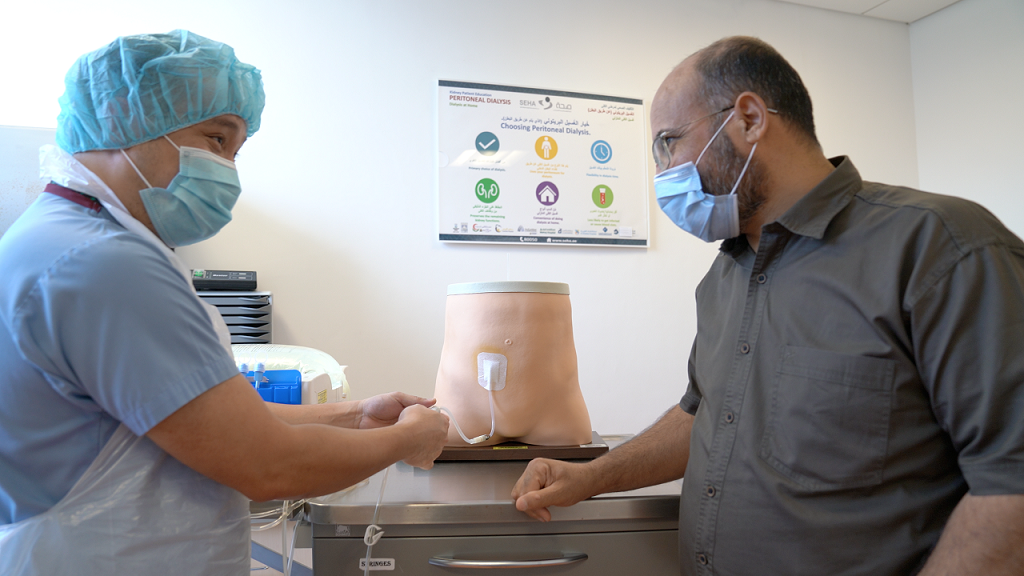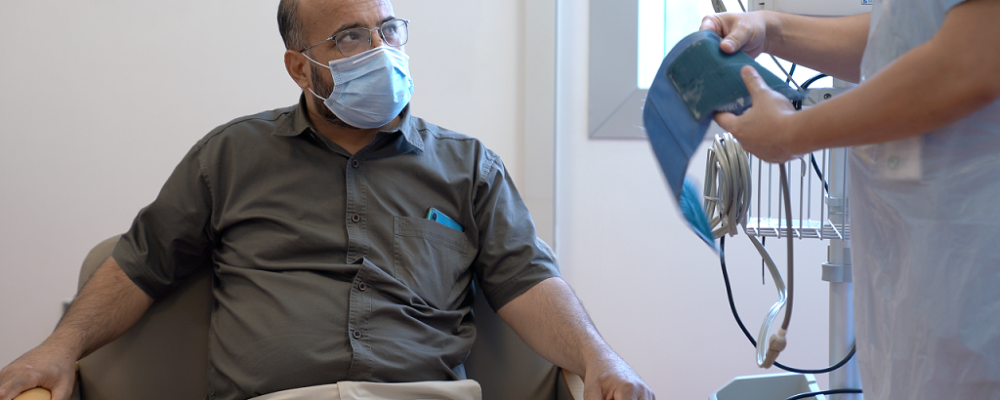Abu Dhabi Health Services Company(SEHA), the UAE’s largest healthcare network,is educating patients with kidney disease about the benefitsPeritoneal Dialysis (PD) has to offer when compared to Hemodialysis (HD). This includes improved quality of life, fewer visits to healthcare centers as well as serving as an effective bridge to kidney transplantation.
Kidney patients frequently get given Hemodialysis (HD) to treat kidney,or renal, failure and some patients are not even offered PD as an option. HD requires multiple weekly trips to a health center and long hours undergoing treatment. PD can be done at home by the patient once a catheter has been fitted surgically.
As part of its commitment to delivering integrated care to patients and educating them on the best available treatment options, SEHA Kidney Care (SKC), a facility affiliated with SEHA, provides world-class clinical services across Abu Dhabi, with three state-of-the-art health centers in strategic urban locations and 10 clinics within SEHA hospitals around the emirate.
Professor Stephen Holt, CEO of SEHA Kidney Care (SKC) added:“In alignment with SEHA’s patient-centric approach to delivering the best healthcare, we remain committed to providing a consistent level of world-class services to kidney disease patients. We provide services for more than 1,300 patients suffering from kidney disease across the Emirate. Our patients continue to be at the center of everything we do, and we continue to focus on our mission to provide ethical, affordable and accessible kidney care services in Abu Dhabi in line with international standards. Whilst we would ideally like to offer a kidney transplant to all patients with renal failure, some patients may not be suitable for a transplant or may not have a living donor. Whilst the number of deceased donors in the UAE is increasing, many people require dialysis treatment to stay well.”
Dr. Ayman Al Madani, Chief Operations Officer at SEHA Kidney Care (SKC), said: “Peritoneal Dialysis (PD) is not a new treatment, but there is a need for wider awareness of its benefits. As a patient-driven treatment, PD enables people to carry on with their lives while receiving the necessary therapy. Through measured steps, PD can be done at home by the patient themselves (or a carer may help),and does not require frequent visits to a healthcare center. This enables our patients to carry on with their lives and to live more comfortably. In addition to the convenience, it provides continuous dialysis, allowing patients to control extra fluid and some blood salts more easily whilst reducing stress on the heart and blood vessels compared with HD.
“With proper education and training, PD is a safe and effective alternative to Haemodialysis. Ultimately, our goal is to improve our patients’ quality of life through offering treatments that can be more easily integrated into their lives and routines.”
Hemodialysis is as a way of replacing some of the functions of the kidneyby using a machine to filter and clean the blood. Blood is pumped out of the body via a tube in a blood vessel or needles put into a large vein, to the machine where it is passed filtered in an ‘artificial kidney’ or ‘dialyser’. This type of treatment often requires frequent and time-consuming visits to a hospital or clinic, typically three times a week.
PD offers a different approach. A soft plastic tube, or catheter, is placed in the patient’s belly usingsurgery. A sterile cleansing fluid is then put into the catheter, which absorbs toxins from the blood. After the filtering process is finished, the fluid leaves the patient’s body through the catheter.
There are two forms of PD available. The first is ‘Continuous Ambulatory Peritoneal Dialysis’ (or CAPD), a manual, machine-free option which is performed while the patient goes about their normal activities. The second is ‘Automated Peritoneal Dialysis’ (or APD) which uses a machine (cycler) to deliver and then drain a cleansing fluid. This is often done at night whilst the patient is sleeping.
The SKC team can advise you which treatments would be likely to work for you, but generally we offer PD as good starting treatment as it is gentler for the body.
Speaking about their experience, SKC patient Mark Thomas said: “When I was diagnosed with renal disease, I had to visit to the clinic over three times a week and spend hours there while the machine filtered my blood. Now, after making the decision to move to PD, I don’t have to plan my time around my appointments. I spend more time with my family and feel more in control of my life. I think all patients would make the shift to PD if they were educated on the options. I’m in a much better place now thanks to the support of my doctors at SKC and their efforts in pointing me in the right direction.”
To learn more about treatment plans and options, please call SEHA on 800 50 and ask for an appointment with a SEHA nephrologist.





